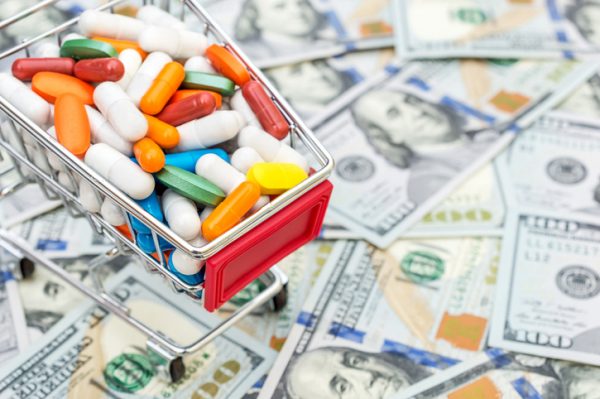
Six years after initially filing suit against CVS, insured customers of the pharmacy giant are finally getting their day in court. On Tuesday, plaintiffs from six states accused the company of knowingly overcharging insured consumers, their pharmaceutical benefit managers, and their health insurers by misrepresenting the “usual and customary” prices of roughly 400 generic drugs.
“This was not an accident. It wasn’t a mistake. It wasn’t an insurance glitch,” said Bonny Sweeney of Hausfeld LLP, plaintiff counsel, in her opening argument, separately adding that CVS was being sued for “almost $100 million,” according to Law360.
Plaintiffs in the case are a certified class of consumers who bought one of nearly 400 generic prescription drugs from CVS pharmacies in Arizona, California, Florida, Illinois, Massachusetts, or New York between November 9, 2008 and July 31, 2015.
The suit accuses CVS of violating state consumer protection laws, overcharging insured customers by misrepresenting the drugs’ “usual and customary” (U&C) prices and basing the higher co-pays on that instead of the actual price it charged customers paying out-of-pocket through its Health Savings Pass (“HSP”) program, one of many such “cash cards” offered by pharmacies across the country.
In their complaint, plaintiffs argued that they were forced to pay higher co-pays because CVS reported the price it charged customers not using the HSP benefit to PBMs, which in turn used those prices to negotiate reimbursement deals with their health plans.

A Deep-dive Into Specialty Pharma
A specialty drug is a class of prescription medications used to treat complex, chronic or rare medical conditions. Although this classification was originally intended to define the treatment of rare, also termed “orphan” diseases, affecting fewer than 200,000 people in the US, more recently, specialty drugs have emerged as the cornerstone of treatment for chronic and complex diseases such as cancer, autoimmune conditions, diabetes, hepatitis C, and HIV/AIDS.
Under customary reimbursement arrangements between insurers and PBMs, plans are only required to pay CVS the U&C price if the usual and customary price is lower than the negotiated price.
Plaintiffs argued that by inflating the U&C price, CVS forced up co-pays for patients using five of the top PBMs: Express Scripts, Medco, MedImpact, Optum/Prescription Solutions and its own subsidiary, CVS CaremarkPCS Health LLC.
CVS, meanwhile, is not admitting to any wrongdoing.
“CVS Pharmacy did not overcharge patients for prescription co-pays,” said Michael DeAngelis, CVS spokesperson, in an emailed statement.
“The CVS Pharmacy Health Savings Pass was a membership program intended for customers who either did not have insurance or chose not to use insurance,” DeAngelis said. “Generic drug prices available through this program were not the usual & customary price charged by CVS Pharmacy, nor the price available to the general public.”
The plaintiffs filed the suit in the Northern District of California under each of the six states’ statutory laws against unfair and deceptive acts and practices (“UDAP”), along with common law claims for fraud, negligent misrepresentation, and unjust enrichment.
In its defense, CVS argued that PBMs were well-aware of the HSP program, sharing testimony from a number of PBM executives to support its argument that such prices did not reflect the U&C price, as they were not offered to the general public.
In a 2017 opposition motion, CVS counsel from Williams & Connolly LLP and Swanson & McNamara LLP successfully argued the plaintiffs were too far removed from any alleged harm to bring suit and that “common answers are lacking.”
While the Northern District of California court agreed, granting CVS’ motion for summary judgment on September 5, 2017, the Ninth Circuit reversed that decision on June 12, 2019, sending the case back to trial.
The three-judge Ninth Circuit panel reasoned:
“Contrary to CVS’s assertion, plaintiffs need not produce evidence that the PBMs believed that CVS misrepresented the U&C price. It is enough for plaintiffs to show that CVS failed to report the HSP prices as U&C prices contrary to the PBM contracts, and that, as a result,plaintiffs were charged higher copayments.”
Expected to commence in 2020, the trial was delayed by jury selection due to the Covid emergency.
According to the company’s SEC filing, CVS is defending against similar suits brought by the Sheet Metal Workers union, Plumber’s union and the state of Mississippi.
Blue Cross-affiliated insurers have lined up to claim their share of the purportedly “billions” of dollars in overcharges, filing their own pair of multi-party lawsuits over the past year. In an emailed statement, CVS called all of these suits “baseless.”
While it’s defended against such claims numerous times, CVS is not the only pharmacy that health insurers have accused of generic overcharging: Kroger, Walgreens, Rite Aid, Kmart, Safeway and others have also faced suit from customers, PBMs and Blue Cross-Blue Shield subsidiaries.
In June 2020, Safeway successfully defended itself against similar charges, reasoning that its program predated 2017 litigation offering clarity on how U&C costs should be reported.
In U.S. et al. v. Safeway, Inc., the Illinois district court ruled that at the time of Safeway’s cash-card program, the courts and Congress had not provided companies running discount programs with guidance on defining U&C. The court said its ruling would have been different if Safeway continued offering the cash discounts into 2017, when the Seventh Circuit decided the Garbe decision, which said cash discount and membership programs should be included in U&C calculations.
That district’s court found that cash card users are members of the “general public,” and prices they pay are the pharmacy’s U&C. Depending on the outcome in this case, CVS might face a district split.
The case is: Corcoran v. CVS Health, Case No. 15-cv-03504-YGR, (N.D. Cal. Nov. 22, 2019).
Picture: Ligorko, Getty Images














